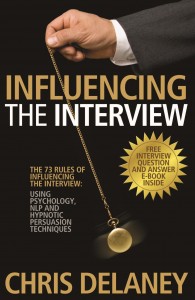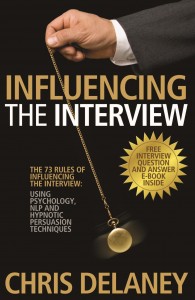A Powerful Linguistic Tool to Help you be more influential in a Job Interview
Last night I watched Derren Brown in his new show “Miracle”
The language Derren Brown uses to influence and persuade is highly powerful and can be used in all different types of situations. But where it is most powerful is in a job interview. Today I will teach you a powerful linguistic tool to help you become more influential in a job interview.
A Fractive Verb is used to presuppose a statement that you want to be taken as a truth. They way you phrase your statement is the difference between the interviewer questioning your statement or accepting it without thinking.
Often, if the interviewer subconsciously questions your statement you will be seen in a a negative light, where as an accepted statement builds on your current positive identity – key for job interview success
As you can tell, this type of linguistic persuasion can be a highly powerful resource to have at your fingertips.
Set Up Your Own Coaching Business
Linguistic Persuasion – the set up
In a job interview, if you desire, you can state anything! You can lie, make things up and say whatever you want and the interviewer has a choice, to believe you or not to believe you.
In fact, this goes for when you state a truth; sometimes the employer will believe you, other times the employer will disbelieve you.
To win more job offers, you need the interviewer to take what you on face value, without questioning you on any level.
This is where we use a fractive verb.
The fractive verb creates a presupposition that is taken as red. Imagine in an interview, an interviewee states “I’m very successful”
This statement gives the interviewer a choice – I believe you are successful or I don’t think you are a successful person. What is even worse, is that when the interviewer doesn’t believe your statement, they start to think negative about you because “you stated that you are a successful person, and I know you are not, you must be a liar” This is very dangerous ground.
The fractive verb bypasses the interviewers resistance. “are you aware of the successes I have had?” The desired outcome is the same, but the set up creates a different response. By using “aware” a fractive predicate, the interviewer doesn’t question if you are a successful person or not, they just presume that you have been successful.
Other fractive verb set up words include;
- knows
- aware
- realised
- learns
- regrets
Linguistic Persuasion – hidden meanings
A fractive verb presumes the truth of an embedded sentence or interview answer, that serves as a complement.
If I said to you “John managed to open the door” this presupposes that John had been TRYING to open the door. Compare this to “john opened the door” which has know presuppositions about trying to open a door (but does presume the door in fact had been opened).
In an interview you can use this language pattern to get the interviewer to feel positively about you. Ideally you don’t want the interviewer to think or question your statement, rather you want them to just accept it as truth.
If an interviewer asks that common question “do you have any key strengths?” You could answer with “one of my strengths is…” this presupposes that you have more then one strength.
Compare this to “I think my strengths are..” The statement isn’t as powerful and can leave doubt in the interviewers mind. Notice how with the “one of my strengths is…” the focus is on the word “one” which means that the rest of the sentence is taken as a truth; they hear it but don’t challenge it.
Here are some more examples
- know “do you know of the many different ways I can increase your profits?” it is taken as red that you will be able to increase the companies profits, because the employer is thinking of the different ways, which was set as a question
- odd “it’s odd how we have clicked on many different levels today, isn’t it?” The interviewer thinks “yes” as they search for the different ways you have clicked today (due to the presumption that you have clicked today)
- imagine “imagine how we will collaborate together” presupposes that you will collaborate together.
Employment King offer;
- Interview Coaching in Manchester
- Career Advice in Manchester
- Online Interview Coaching
- Interview Confidence Sessions in Manchester
- Interview and Presentation Sessions in Manchester
- Mock Interview Sessions in Manchester














